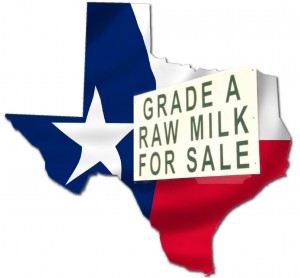New rules proposed for Texas raw milk
The Texas Department of State Health Services (DSHS) has drafted new rules for regulating raw milk. This announcement, made on July 14, came without any prior warning, and with very little time provided for public input. The deadline to submit comments on the draft rules is Tuesday, July 28.
 This is only a first step in the rulemaking process and there will be more opportunities for public comment as the process moves forward – but it’s important to speak up early. We have done a detailed analysis of the draft rules, and we’re asking you to support our suggested changes or submit your own comments if you have additional or different concerns.
This is only a first step in the rulemaking process and there will be more opportunities for public comment as the process moves forward – but it’s important to speak up early. We have done a detailed analysis of the draft rules, and we’re asking you to support our suggested changes or submit your own comments if you have additional or different concerns.
The draft rules are complicated and contain multiple confusing provisions. After a close look, we have several major concerns.
Requirement that farmers provide DSHS with customer lists
The draft rules require raw milk farmers to provide the agency with a customer list that includes the amount and types of products sold to each customer. Not only does this impose an undue burden on the farmer, but it is an unacceptable intrusion into consumer privacy. People shouldn’t have their names and buying habits handed over to the government simply because they want to drink raw milk!
Definition of the word “sale”
The rules require a Grade A permit to sell raw milk … an apparently common-sense provision that has proven to be surprisingly confusing due to the breadth of the regulatory definition of “sale.” But while the current definition is flawed and should be changed, the draft definition is even more problematic. The draft definition is so confusing and ambiguous, we can’t say for certain how it would apply – which is itself a problem. And it appears to be a back-door approach to classifying herdshare agreements and/or buyers’ groups as illegal “sales.”
Why, for example, does the rule define “sale” as the “acquisition” of milk when the traditional definition relates to an action by the seller, not the purchaser? Similarly, the use of the word “conveyance” in the definition implies that anyone “conveying” a gallon of milk in their car for a friend could be considered making a “sale.” And in one subsection, “sale” is defined as including “the transfer or acquisition of milk through a contribution system,” which has no legal definition but would seem to be aimed at herdshares and buyers’ clubs.
Provisions for home delivery
While we were initially encouraged to see that the draft rule included a provision to allow farmers to deliver raw milk, it is limited to DSHS’ “retail foods jurisdictions,” which generally include only rural areas. Anywhere there is a local health department, which includes every significant urban center, would be excluded. So under the draft rule, raw milk farmers still would not be allowed to deliver to the vast majority of Texans.
To make things more difficult, there’s no online resource that indicates which areas are under local health department jurisdiction vs. DSHS jurisdiction. So, a farmer would have to call local health departments to determine if a customer’s address was within DSHS jurisdiction or not.
Additional concerns
Our comments to DSHS also address these issues:
- The draft rule adds a prohibition on freezing raw milk. We know of no health or safety reason for this ban.
- Addition of a warning label. In the past, we supported the same language as being proposed, but we asked that it be included IF sales were to be allowed at farmers’ markets. The label is unnecessary for sales that occur on-farm, since customers are knowingly seeking out raw milk.
- Inspection frequency. The draft rules move away from the current frequency set for inspections and testing, proposing “a frequency determined by the department.” This leaves the door open for either extremely infrequent or extremely frequent inspections, both of which are problematic.
- Banning raw butter. The draft rule excludes raw butter from the allowed raw milk products. We provide data on raw butter’s excellent track record for safety (drawn from the Farm-to-Consumer Legal Defense Fund’s petition to the FDA to legalize the interstate shipment of raw milk butter).
Missed opportunities for improvements
FARFA’s comments also point out several areas where there have been problems under the current regulations, which could be fixed during this rulemaking process:
- Exempting micro-dairies from the extensive permitting requirements
- Allowing sales at farmers’ markets
- Setting out procedures to ensure that inspectors properly handle raw milk samples, so that farmers aren’t unfairly penalized
- Raising the allowable coliform (harmless bacteria) counts
TAKE ACTION
You can read the draft rules on DSHS’s website (scroll down to draft rules and informal comments). Please take a few minutes to read the full text of our comments. We encourage you to email comments before the deadline tomorrow, and either write your own comments with your major concerns or simply state that you support the comments submitted by Farm and Ranch Freedom Alliance.
To be considered by the agency, comments must be emailed to milk.regulatory@dshs.texas.gov.
Please also send a copy Info@FarmAndRanchFreedom.org, so we have a record of everyone’s comments.
Again, this is just the beginning of the formal rulemaking process. The Department will provide additional, and more extended, periods for public comment at different stages of the process. We’ll keep you informed about those opportunities and about any changes to the content of the proposed rule as they arise.
Thank you for taking action!